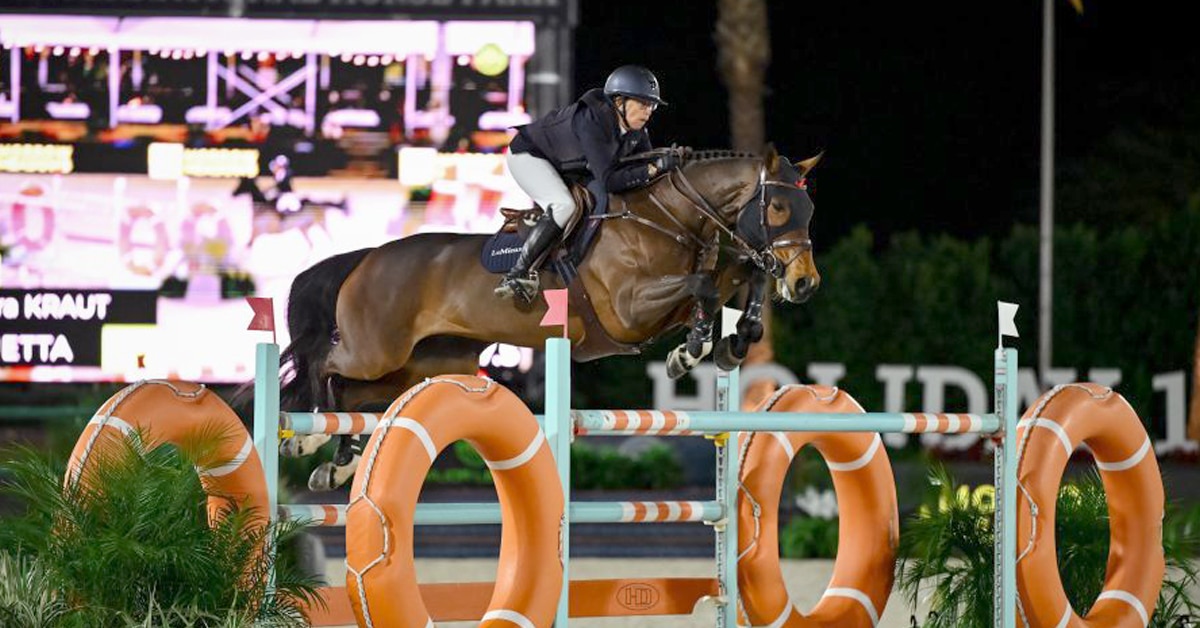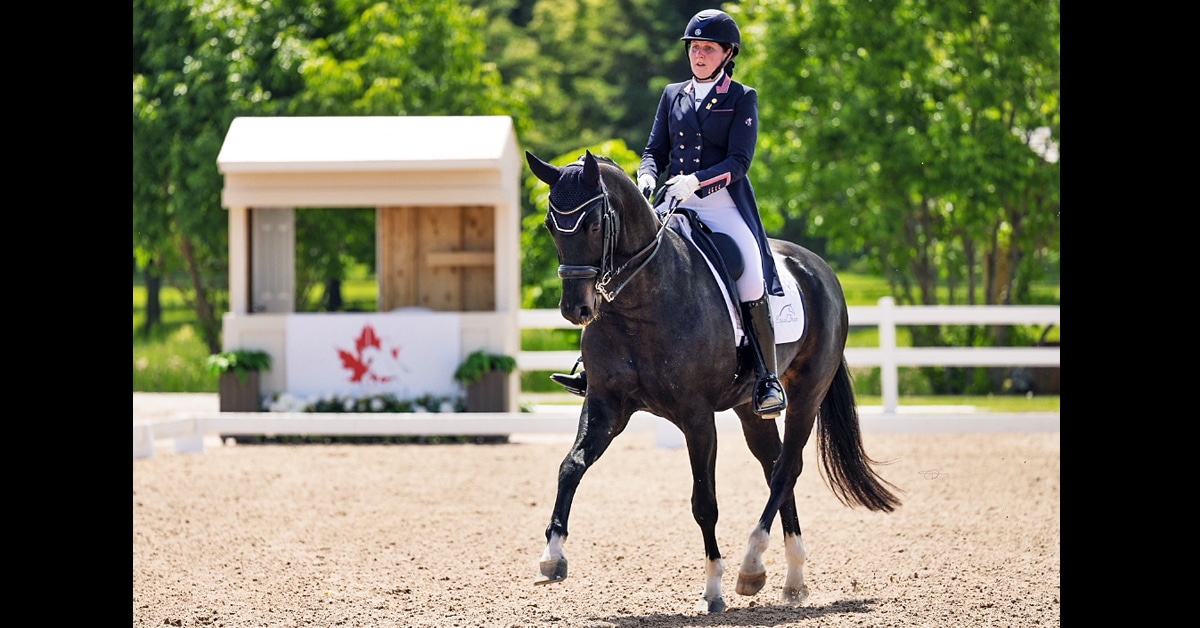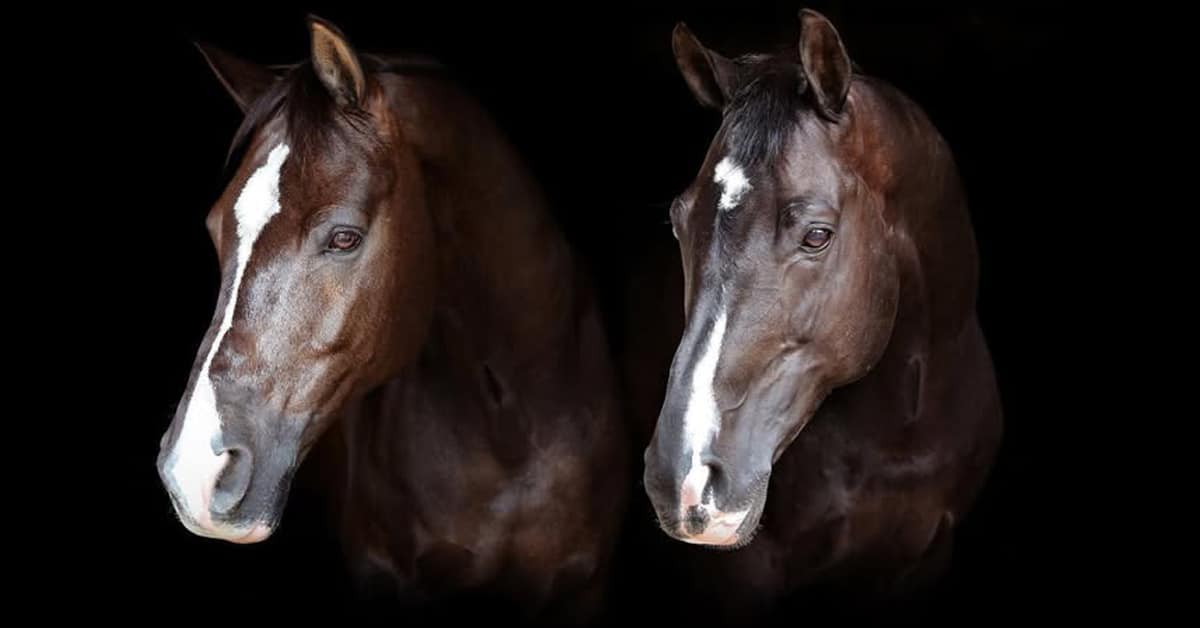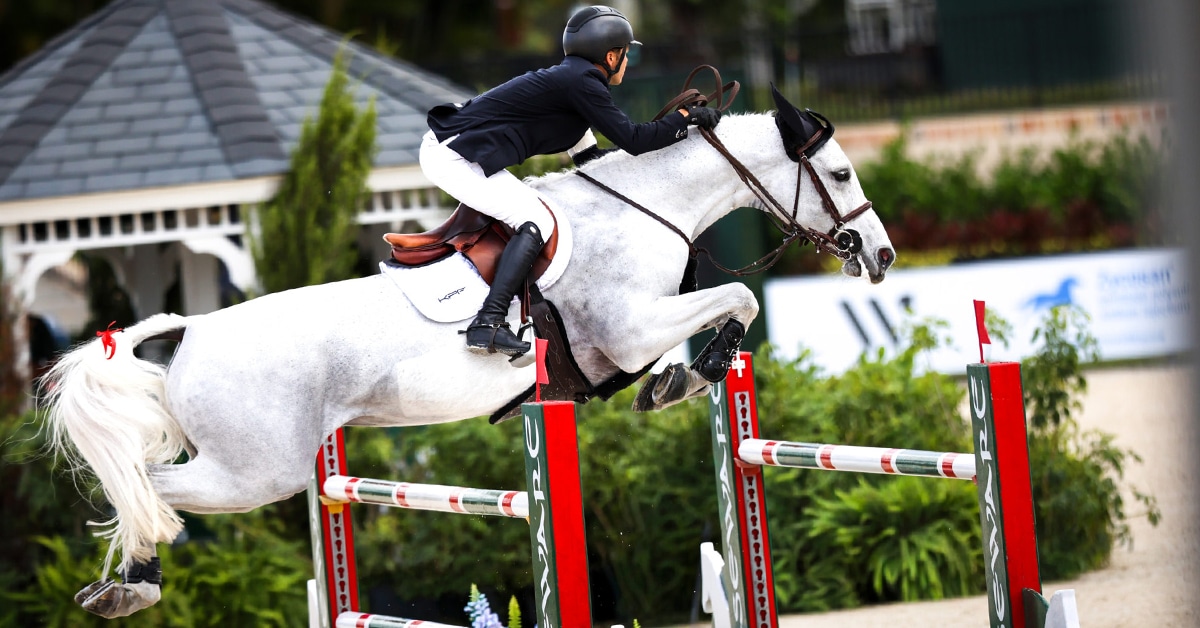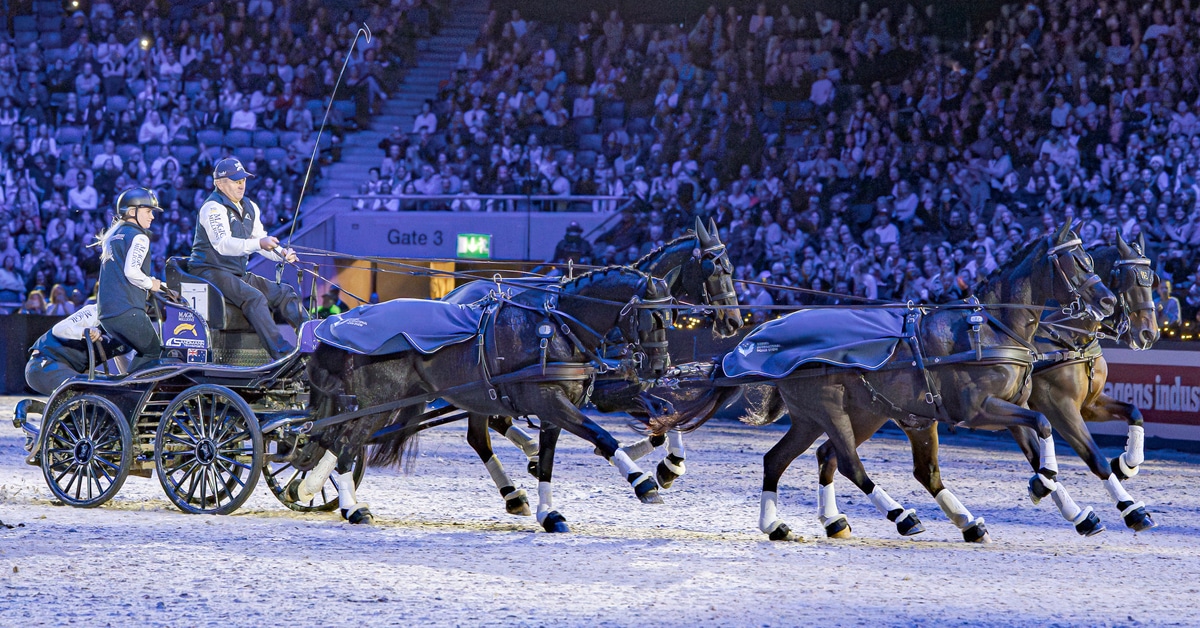Driving, Dressage and Jumping all had their share of the spotlight at the FEI Sports Forum in Lausanne (SUI) today, with three Round Table sessions focusing on the individual disciplines on a busy final day at the IMD business school.
Driving Round Table
Driving was the first session to get underway today, focusing on increasing athlete participation in the discipline, giving existing athletes more opportunities to compete internationally and exploring ways of making the sport more attractive to audiences and sponsors.
Several proposals key to this vision were delivered by a six-strong panel headed by Karoly Fugli (HUN), Chair of the Driving Committee, including the introduction of new star levels (1, 2, 3 and 4-star), with a suitable qualification system and network of FEI Officials to support this.
Significant competition format changes in all phases were also proposed, to include giving Organisers the option to switch the Marathon and Cone phases; introducing two Marathon phases instead of the current three; and the introduction of a new Cones layout to make the competition more exciting. A number of delegates suggested that the warm-up phase should be removed from the competition format.
“This year over 160 FEI Driving events will be held around the world”, explained Bettina de Rham, FEI Director Driving. “To maintain this growth, and to attract our Driving stars of tomorrow, the sport must appeal to wider audiences, the format needs to be media-friendly, and sponsors need to see the value of this sport”.
Panellists for the Driving Round Table were: Karoly Fugli (HUN), Driving Committee Chair; Boyd Exell (AUS), Driving Committee Vice-Chair; Klaus Christ (GER), Driving Committee Member; Ed Young (USA), Driving Committee Member; Mark Wentein (BEL), Driving Committee Member; and Bettina de Rham, FEI Director Driving.
All discussions from today’s Driving Round Table will be taken into the Driving Committee meeting, which will be held at FEI Headquarters tomorrow (10 April).
Dressage Round Table
The future of Dressage following the huge success of the London 2012 Olympic Games, the introduction of an FEI Nations Cup™ Dressage series, and the review of the judging format of the Freestyle to Music tests were the main discussion topics at today’s Dressage Round Table.
FEI Dressage and Para-Dressage Director Trond Asmyr opened the session, celebrating the fact that the sport is currently enjoying the greatest level of popularity in its history. It is vital to secure its further development in terms of spectator numbers and appeal to young riders, event organisers, new fans, the media and especially television, he commented. In order to address these challenges successfully, the sport must be well structured.
FEI Dressage Committee Chair Frank Kemperman proposed the introduction of a Medium Tour, which would bridge the significant gap between Grand Prix, the sport’s highest level, and Small Tour. “Currently there are 660 Grand Prix horses on the FEI World Dressage Rankings,” Kemperman said. “Grand Prix is a difficult level which is accessible to relatively few combinations that compete only six to eight times a year. It would be a huge benefit to organisers to make it possible for the top riders to compete more often and to open the sport to new faces,” he said.
A new Dressage test between Intermediate I and II will be developed for use at international events to provide an easier transition for young horses and young riders, allow for a higher number of starters at shows. The new level will also benefit for horse welfare.
Delegates welcomed this proposal, particularly as a Medium Tour would help grow the sport in countries outside Europe. “This is a very good development and we embrace it,” Jim Wolf, USEF Executive Director of Sport Programmes said. “A Medium Tour would be very important for us,” Colombian Dressage rider Constanza Jaramillo added.
A similar structure exists on the national level in several countries, and their experience will be very useful in the further development of this project.
The introduction of the FEI Nations Cup™ Dressage is also an important element for the future of the sport. Starting in May this year, a test season will be conducted to evaluate the series’ potential. The current calendar is as follows:
CDIO 3* Vidauban (FRA), May17-20
CDIO 5* Rotterdam (NED), June 19-23
CDIO 5* Aachen (GER), June 25-30
CDIO 3* Hickstead (GBR), August 1-4 (subject to confirmation).
“Up till now we only had Nations Cups at Championships,” International Dressage Officials Club (IDOC) representative Wojtek Markowski (POL) said. “Introducing a dedicated series is a good step forward. It will allow riders of various levels to compete alongside each other and will help young riders to learn from being on a team.”
Trond Asmyr spoke about the proposed changes to the Freestyle judging format. The Freestyle, which is hugely popular with spectators and TV viewers and has been instrumental in the current popularity of the sport, contains the most subjective judging elements of all Dressage tests. Continuous efforts should therefore be made to increase its objectivity. The ideas put forward to achieve this include changing the artistic marks, further defining the degree of difficulty and improving the way the selected music is judged.
“Today we received very good feedback from the participants which is reassuring as it means we’re on the right track,” Asmyr commented. “Our aim is to make the judging as objective as possible, but it must not be so complex that it delays the results. We will consider all these components but will not comprise on the existing key elements.”
A test event where the new ideas will be evaluated will be organised this year. The plan is to introduce the new judging methods in 2014.
Panellists for the Dressage Round Table were Frank Kemperman (NED), Dressage Committee Chair; Dressage Committee members Thomas Bauer (GER), David Hunt (GBR), Kyra Kyrklund (FIN); and Hans-Christian Matthiesen (DEN); and Trond Asmyr, FEI Director, Dressage and Para-Dressage.
Jumping Round Table
The Jumping Round Table was the final session at the two-day FEI Sports Forum, focusing on rules revision, the Event Classification System and CSI invitation rules.
John Madden, Chair of the FEI Jumping Committee, opened the session with a report on the Event Classification System (ECS) project, which is designed to evaluate FEI Jumping Events with the ultimate goal of using the ECS to grade events.
“The Event Classification System is about trying to exceed minimum requirements,” John Madden stated, explainingS that the Jumping Committee has looked at developing a similar method that could be used more widely, potentially expanding the system to other disciplines.
Evaluations have been conducted at FEI World Cup™ qualifiers in North America for the past four years and, using a similar system, the FEI did test evaluations at three events in Western Europe this season. The North American evaluations were conducted by an independent evaluator at each event, but in order to avoid additional expense, the Western European evaluations involved individuals already present at the venues such as riders, judges, officials, spectators etc.
Scoring is based on a number of criteria, but is weighted towards the technical aspects of the event such as footing, stabling, the field of play and warm-up areas, as well as seating capacity and spectator numbers, television and media coverage, results service, trade area and catering. Questions were tailored to produce fact-based rather than opinion-based responses, and areas of the results were weighted for importance, with for example rules compliance and footing quality weighted more heavily than printed material or press facilities.
The combination of all the data provides an overall score for each event, producing an objective ranking system that can be used to solve calendar disputes, assign star levels and tie in to the awarding of points for the Longines Rankings.
The system has proved to be extremely successful in demonstrating areas of strength and weaknesses to Organising Committees, “but if we want to be helpful we have to be able to show why an event didn’t score 100%,” John Madden said. “For events looking to improve, this provides valuable feedback and will help to strengthen the FEI brand as well as the sport itself
“We’re very happy to report that we have really tangible results now. The amount of data from the ECS, combined with the online entry system, will give us a really valuable and complete picture of our over 3,000 events around the world.”
Jumping Committee member Stephan Ellenbruch gave a comprehensive report on the revision of the Jumping Rules. “Competitions must be fair for all competitors and it is essential that strict and detailed Jumping Rules are established to regulate competitions,” he said. “We need strict rules to guarantee fair sport, but we need rules that are made for the athletes, not athletes made for the rules.”
The FEI had asked for proposals from National Federations, athletes, officials and other stakeholders, and a total of 150 proposals were discussed by the Jumping Committee, with agreement being reached in about 130 cases. With such a complete rules revision, there was not sufficient time to go into every amendment, and Stephen Ellenbruch focused on the proposed revisions to the rules on water jumps, headgear, hind leg boots, officials, Grand Prix qualification and special competitions.
The Jumping Committee is currently reviewing hind leg boots that are not used for protective reasons and a working group has been formed to look into this in more detail. The working group is made up of Stephan Ellenbruch, fellow Jumping Committee member Max Kuehner, Veterinary Committee member Philip Benoit, a biomechanic expert, and FEI Jumping Director John Roche.
Jumping Committee member Marco Fusté wound up the session with a presentation on the CSI Invitation Rules, which generated a discussion on the percentage of home and foreign riders, wild cards and pay cards.
Panellists at the Jumping Round Table session were: John Madden (USA), Jumping Committee Chair; Stephan Ellenbruch (GER), Jumping Committee members Marco Fusté (ESP); Max Kuehner (GER); and Vladimir Platov (RUS); and John P. Roche, FEI Director Jumping.
FEI Secretary General Ingmar De Vos then brought the 2013 FEI Sports Forum to a close. “I believe we can say the Sports Forum was a success, but this is not the end, rather it’s the beginning of the decision making process, and many of the items we have discussed over the past couple of days will be submitted for approval at the General Assembly. But please remember, it’s not the last opportunity to participate further in the debate either as the online platform will be open for at least the next four weeks.”
All presentations made at the Sports Forum are now available on www.fei.org and executive summaries of all sessions will also be on the website within the next couple of days.
More News
